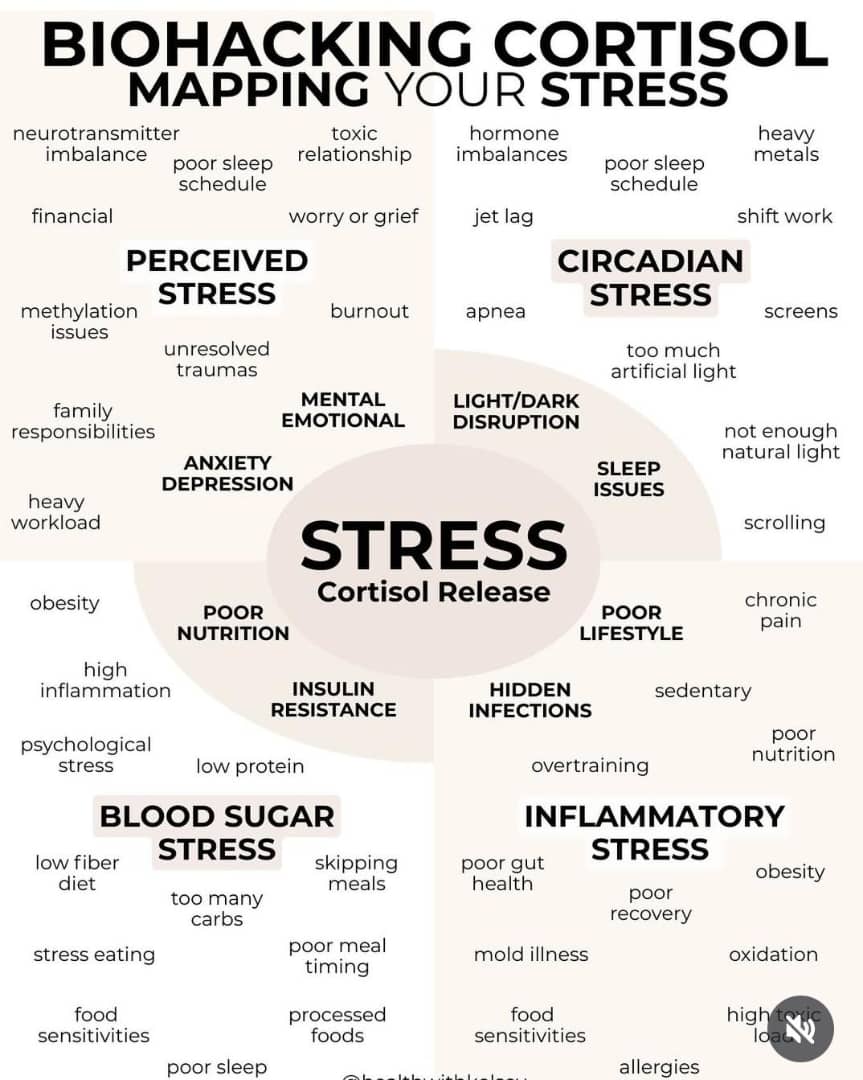BIOHACKING CORTISOL MAPPING YOUR STRESS
neurotransmitter imbalance
poor sleep schedule
toxic relationship
hormone imbalances
poor sleep schedule
heavy metals
financial
worry or grief
jet lag
shift work
methylation issues
PERCEIVED STRESS
unresolved traumas
burnout
apnea
CIRCADIAN STRESS
too much artificial light
screens
family responsibilities
LIGHT/DARK DISRUPTION
not enough natural lighthttps://www.facebook.com/DeutzFahr/
heavy workload
ANXIETY DEPRESSION
SLEEP ISSUES
scrolling
POOR LIFESTYLE
chronic pain
STRESS Cortisol Release
obesity
POOR NUTRITION
high inflammation
psychological stress
INSULIN RESISTANCE
HIDDEN INFECTIONS
sedentary
poor nutrition
low protein
overtraining
BLOOD SUGAR STRESS
low fiber diet
too many carbs
skipping meals
poor gut health
INFLAMMATORY STRESS
obesity
poor recovery
stress eating
poor meal timing
mold illness
oxidation
food sensitivities
poor sleep
processed foods
food sensitivities
allergies.
high
How To Eat When Stressed” STRESS ISN’T JUST A FEELING – It’s a Full-Body Experience.
Stress isn’t only about emotions. Every stressor, inside and outside your body, adds to your total load and impacts cortisol, insulin, hormone balance, and metabolism.
The Four Main Stress Drivers
1 Inflammatory Signaling – Ongoing gut issues, toxins, infections, or injuries keep cortisol chronically elevated.
2 Blood Sugar Swings – Skipping meals, processed foods, and poor macros trigger cortisol spikes and insulin resistance.
3 Circadian Disruption – Poor sleep, artificial light, and shift work throw off natural hormone cycles.
4 Perceived Stress – Work, relationships, finances, trauma, and daily pressure all strain the nervous system and hormone regulation.
How They Affect You
Stressors stack up, overloading your system and driving hormone dysfunction.
Cortisol dysregulation impacts energy, mood, metabolism, and immunity.
Left unchecked, stress shows up as symptoms all over your body.
Where to Start
Identify your biggest stressors-are they internal (gut, blood sugar) or external (work, sleep, relationships)?
Support your nervous system with daily movement, sunlight, hydration, and relaxation practices.
Protect circadian rhythm with morning sunlight, less screen time at night, and a consistent bedtime.
Balance blood sugar with protein, healthy fats, and fiber at every meal.
Calm inflammation by removing trigger foods, supporting gut health, and lowering toxic load.
- Stress isn’t just in your head-it’s in your body.
Start small, stack habits, and lighten your stress load step by step


























Thank you for your sharing. I am worried that I lack creative ideas. It is your article that makes me full of hope. Thank you. But, I have a question, can you help me?